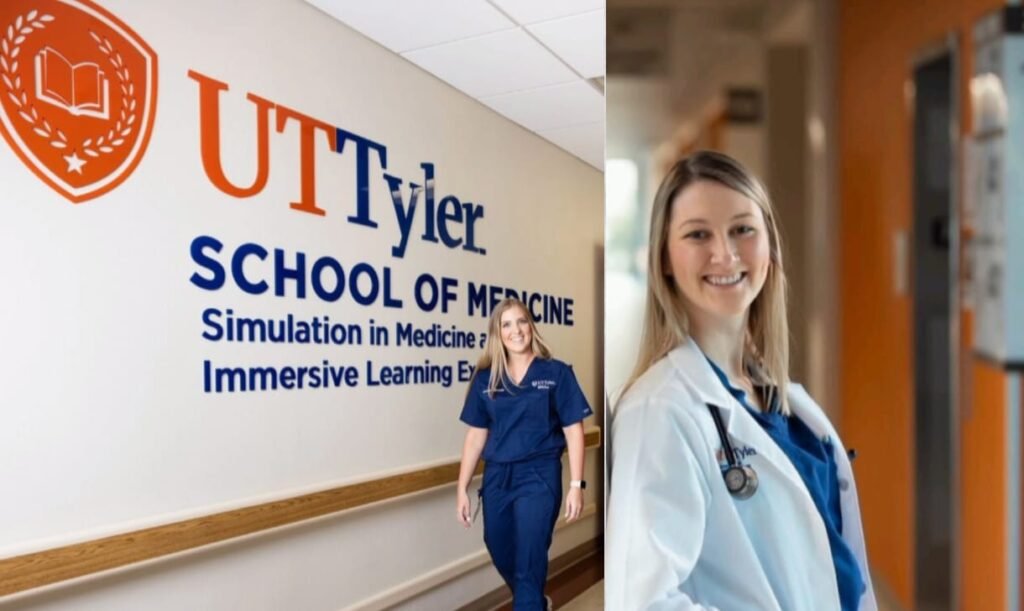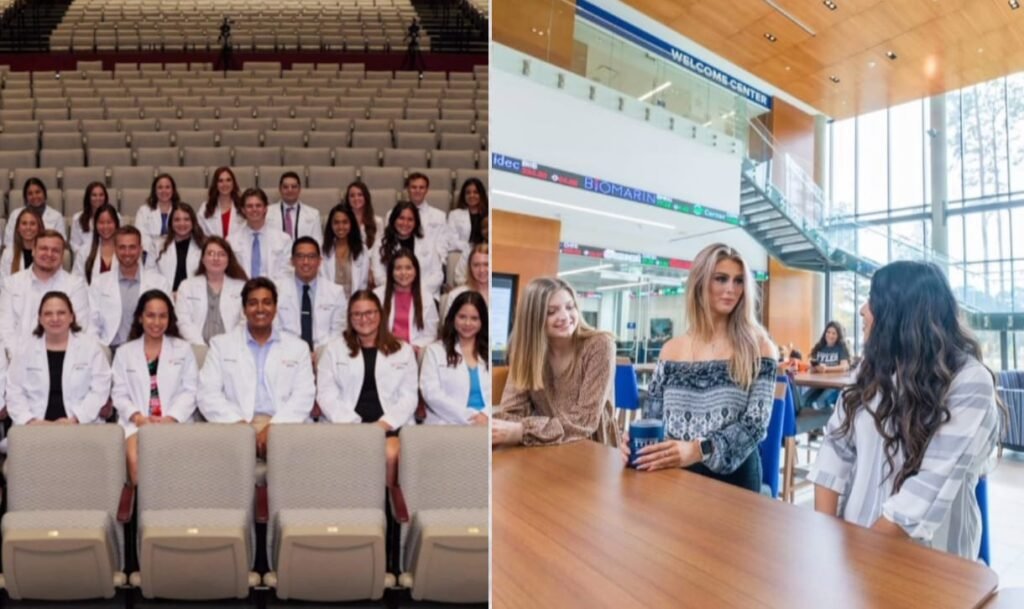UT Tyler School of Medicine Overview: Curriculum, Clinicals, and Community Impact
Introduction
The UT Tyler School of Medicine is one of the most promising medical institutions in the United States, uniquely positioned to transform healthcare in rural East Texas. As the first medical school in the region, it aims to solve physician shortages and provide innovative, community-centered medical education.

With its cutting-edge curriculum, expert faculty, and a mission rooted in service, the UT Tyler School of Medicine is not just educating doctors—it’s shaping the future of American healthcare.
Why UT Tyler School of Medicine Stands Out
While many medical schools offer quality education, few combine academic rigor with a commitment to rural healthcare like the UT Tyler School of Medicine. Here’s what makes it unique:
Rural health emphasis: Prepares students for real-world challenges in underserved communities.
Strong clinical partnerships: Students get hands-on experience through UT Health East Texas.
Small class sizes: More personalized learning and mentorship.
Modern facilities: State-of-the-art labs, anatomy suites, and simulation centers.
Mission-driven approach: Empowers students to lead with compassion and ethics.
Mission, Vision & Core Values
The UT Tyler School of Medicine has a clear mission:
“To improve the health and quality of life in East Texas and beyond through excellence in medical education, research, and clinical care.”
Core Values:
Integrity
Compassion
Respect
Innovation
Collaboration
Accountability
The school focuses on training a new generation of medical leaders who can bring change at the grassroots level.
Academic Programs Offered
1. Doctor of Medicine (M.D.)
The flagship program at the UT Tyler School of Medicine is its 4-year M.D. degree. The program is designed to:
Deliver strong foundational knowledge
Integrate early clinical exposure
Emphasize problem-solving and rural health
Support interprofessional learning
2. Graduate Medical Education (Residency)
UT Tyler supports over 20 GME programs including:
Family Medicine
Psychiatry
Internal Medicine
General Surgery
Emergency Medicine
3. Post-Baccalaureate & Research Programs
In addition to the M.D., the school also offers:
Biomedical research pathways
Interdisciplinary health science programs
Opportunities for PhD partnerships
Curriculum Structure (Year-Wise Breakdown)
The UT Tyler School of Medicine curriculum is divided into three core phases:
Year 1–2: Foundations Phase
Human biology, anatomy, physiology, pharmacology
Small group problem-based learning
Community health modules
Early clinical exposure in real-world settings
Year 3: Clinical Clerkships
Core rotations in internal medicine, OB/GYN, psychiatry, pediatrics, surgery, and family medicine
Training in rural and urban hospitals
Year 4: Advanced Clinical Training
Specialty electives
Capstone project
Residency application prep
Advanced simulation training
Admissions Process (Step-by-Step)
Getting into the UT Tyler School of Medicine requires more than just good grades. It values passion, purpose, and a commitment to underserved communities.
Basic Eligibility:
Bachelor’s degree (any major with pre-med prerequisites)
MCAT score (preferably 500+)
GPA 3.0+
US citizen or permanent resident
Application Platform:
TMDSAS (Texas Medical & Dental Schools Application Service)
Additional Requirements:
Secondary essays (with emphasis on rural care & East Texas)
Letters of Recommendation (at least 3)
Interview (in-person or virtual)
Campus & Facilities
The medical school is located at the UT Tyler Health Science Center in Tyler, Texas. Facilities include:
High-fidelity simulation labs
Dissection and anatomy suites
Telemedicine training centers
Research and wet labs
Student lounges, gyms, meditation zones
Every facility is designed to support an immersive and modern medical education.
Faculty & Mentorship
The UT Tyler School of Medicine boasts a low student-to-faculty ratio, ensuring that every student receives personalized attention.
Over 250 full-time and adjunct faculty
Mentorship-driven learning
Diverse backgrounds in primary care, surgery, public health, and research
Regular one-on-one check-ins and career guidance
Research Opportunities
Research is a core part of the academic mission. Students are encouraged to participate in research from Year 1.
Key Research Areas:
Rural healthcare innovation
Infectious disease and tuberculosis
Mental health in underserved communities
Preventive medicine and chronic care
Health technology and telemedicine
UT Tyler’s partnerships allow students to publish, present, and even apply for research grants.

Clinical Partnerships
One of the strengths of the UT Tyler School of Medicine is its direct access to real patients through UT Health East Texas.
Clinical Sites Include:
UT Health Tyler
UT Health North Campus
Local clinics in rural counties
Community health centers
Specialty hospitals
Students are not passive observers—they’re active members of the clinical team.
Student Life at UT Tyler School of Medicine
Life as a med student isn’t just about textbooks. At UT Tyler:
Wellness programs (yoga, mental health support, gym)
Medical interest groups (dermatology, surgery, pediatrics)
Leadership & volunteer roles
Monthly community service days
Diverse and inclusive campus culture
The school ensures every student has both academic and emotional support.
Financial Aid & Scholarships
Medical school can be expensive, but UT Tyler makes it accessible.
Texas resident tuition: Lower than national average
Federal aid & loans available
Scholarships for academic excellence
Scholarships for rural service commitment
Financial counseling for debt management
Community Engagement
The UT Tyler School of Medicine stands out for its strong connection to East Texas communities.
Free health clinics
Health fairs and school outreach
Rural medical camps
Mobile care units
Patient education drives
Students get to make a real impact, starting Day 1.
Career Prospects & Residency Matches
Graduates from the UT Tyler School of Medicine are expected to match successfully into competitive residency programs.
Strong GME ties within the UT Health network
Residency tracks in rural care
National-level placements expected
Career support, interview prep, and mock drills
Alumni mentorship network
Diversity, Equity & Inclusion
UT Tyler is committed to building a medical community that reflects the nation.
Programs for first-gen students
Women in Medicine initiatives
Minority student support
LGBTQ+ inclusion
Bias and cultural sensitivity training
FAQs
Q: Is UT Tyler School of Medicine accredited?
Yes, it received preliminary LCME accreditation and welcomed its first class in 2023.
Q: Is the M.D. degree valid across the USA?
Absolutely. It holds the same status as any other LCME-accredited M.D. degree.
Q: Can I apply if I’m not from Texas?
Yes, though Texas residents are given preference. Out-of-state applications are welcome.
Q: Is research mandatory?
No, but it’s highly encouraged, especially if you’re targeting competitive specialties.
Conclusion
In an ever-evolving world of healthcare, the need for well-trained, compassionate, and community-driven physicians has never been greater. The UT Tyler School of Medicine rises to this challenge by not only offering a rigorous academic foundation but also by instilling a deep sense of responsibility toward underserved populations, especially in rural East Texas.
With its student-first approach, state-of-the-art facilities, strong research programs, and unmatched clinical partnerships, the UT Tyler School of Medicine equips future doctors with the tools they need to make a real-world impact. From early exposure to patients to intensive community outreach programs, students here are not just observers—they’re active participants in transforming lives.
Whether you’re a pre-med student looking for the perfect place to launch your medical journey, a parent seeking the best environment for your child, or a professional wanting to understand the next big name in healthcare education, the UT Tyler School of Medicine proves to be an institution built on purpose, passion, and progress.
If you’re ready to make a difference in the world through medicine, the path begins here—at the UT Tyler School of Medicine.


